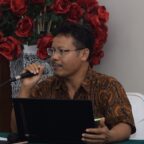The rapid increase of the world population causes an increase in parallel with the world’s food and water demand. The development of the agricultural sector has contributed to the improvement of the food security. The problems of the water resources are getting more severe due to climate change, poor management and pollution. The shortages of water will result in increasing competition in many sectors, which will constrain agricultural production and will affect the income and livelihood opportunities for farmers especially in rural areas of the lower income countries. Therefore, it is important to develop affordable micro-irrigation for small-scale farming and promote the appropriate micro irrigation design among small-scale farmers in rural areas which would contribute to increase agricultural productivity. The main objective of this project is improving capabilities of farmers in designing and applying the appropriate affordable micro-irrigation technology. The method to obtain the project is by using multiple approaches analysis consisted of technology performance assessment and capacity development analysis, specifically the comparative analysis of “before” and “after” implementing the technology intervention. Farmers Field School (FFS), training and workshop will be conducted to strengthen the capacity of farmers, local communities, and government by delivering professional learning and giving assistance on sustainable agricultural practices.
Project leader
Project collaborators
Local Government (Department of Agriculture staff)
“I think this project bring the greatest impact on increasing skill and knowledge of local farmers to adopt new technologies and to increase their agricultural productivity in the drought prone areas. Local farmers had a chance to learn about low-cost micro irrigation technologies and sustainable farming practices on the plot site. I believe that FFS methods have a significant impact because farmers learning by doing. Through FFS activities, farmers find it much easier to apply the technologies to their own farms. It allows the project program can be replicated to other site by trainee farmers."
Trained farmer
“Before joining this project, I have agricultural field to cultivate paddy when rain season, but when dry season comes, I can’t cultivate crops due to water is scarce and difficult to watering crops manually. Therefore, my income is low because it depends on paddy. After joining the FFS activities, I learned how to irrigate crops efficiently through micro-irrigation technologies. Micro-irrigation technology is very new technology for me that I have never seen before. Firstly, I think this technology is expensive but my thought is wrong. This technology is affordable for farmers because some components can be made from local materials and easy to maintain. I feel grateful to join this training because I have learned how to design, operate and maintain micro irrigation technology as well as how to cultivate high value crop such as golden melon with sustainable way using organic matter and biopesticide for controlling pest. I believe this project has a big impact to our farmers community to increase their agricultural product without any doubt, thus it can increase our income”
Project publications

Capacity development of farmer group in using affordable micro-irrigation for small-scale farming in marginal land

Design of small gravity drip irrigation for smallholder farming in water scarce region of Indonesia



